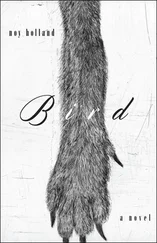Ida sees Verda moving around her husband, sponging him down, drying him. Her knees give in a little. She sees him lift his arms up — as if to hang from something, as if he is waiting, Ida thinks, as the Negress must have waited to fly from her trapeze.
RC drops his arms and Verda makes him lift them up again. She must have known about the Negress. She doesn’t think about the Negress. She tries to think instead how RC looked in the days he used to come and hang his arms on her mother’s car. It becomes almost all she can think of, the way he might have been.
She scrubs his chest, his belly. She has to steady his flesh with her hand, pull the folds of his skin smooth to clean him. She finds grayish strips at the bottoms of the folds she scrubs with her sponge to slough up. She finds ribby spots on his member, whitish patches where the skin was cut to graft to the skin of his head.
All of this, we could leave out. We know RC would. Seeing Ida back behind the store where the garden used to be, Verda, we know, would forget the day the dog got hit by the livestock truck, forget the whole season — the early peas and that Silver Queen in the garden coming on.
The next day, the dog dead, the first day and the last RC ever darkened any door of the aluminum mall, he bought himself a TV. He left the P.O. and the bank box keys and caught the bus to Paducah to buy a case of gin.
Ask anyone. Ask Ida. Ida will tell you he called his wife to stay awhile while he dug the grave and watch him, talk to him — and that Verda never came, she will say. RC gathered what was left of his dog, on the blacktop, in the weedy ditch, in the broken glass and beaten shoes, the soot of the sloping shoulder. He found shreds of ear and paw pad, patches of yellowish belly skin, carried them back to the place he would dig in the new green shoots of corn.
Verda, please, come on here, talk to me while I dig.
She dusts his crotch with talcum. She pulls his pants on. She pulls a fresh shirt down over his head and walks him back to his barber chair, moving slowly, letting the hour resume its groove, its old trick of nothing changing that makes a life hold still.
The next time the boys come back, Ida hears that the Negress never flew from a trapeze. The Negress, according to Arnold, was a dwarf who twirled from a length of rope looped through a hoop in her nose. The girls watch RC to see in him a hint of some objection.
“Swear to God,” Arnold says. “What she hung on by her nose.”
RC gapes and twitches.
“That’s enough,” Verda says. “He’s hungry.”
“He’s not hungry,” Ida says. “He’s thinking about that Negress.”
She makes a hoopy shape with her fingers, spins, her head thrown back, the tips of her thumb and finger hooked into her nose.
“That’s right, that’s right,” Arnold says, clapping. He doesn’t know whether the twirling dwarf was something he saw or heard of.
Verda climbs in RC’s barber chair, lifting out the hem of her dress so she can straddle his knees and feed him. “Mercy,” she says, “Ida, the way you carry on.”
When RC gapes, she slips the spoon between his bunched-up molars.
They hear, the boys, RC feeding, the clatter of RC’s tongue. They hear the suck and creak in his throat when RC tries to swallow.
RC, he had a accident.
RC, he had an old dog; he had a two-headed cow.
He carnied from town to town, to towns as far off as Sarasota. It’s no accident, the boys think, the shape RC is in now. Think back to 1910, they think, trying not to hear in the sounds he makes anything familiar, anything quite like the sounds they hear in the rooms where they live alone. If you had known RC back then, they say. Back then, they say — in what RC calls his glory years, the dirty-shirt days of the carnival — that’s where the seed of what would happen is, of what has happened now. It’s no accident, no wonder now, that they themselves are shining — church-going, stay-at-home boys who dandy through these afternoons since RC came from Memphis, oh, their bowlers brushed, their good shoes buffed, their wives dead and their wedding rings dropped in their trouser pockets.
RC kicks his chair, pointing. Verda twists open a fresh loaf of bread to make him more graveyard stew. Ida makes herself dizzy spinning with her fingers hooked in her nose.
They stand in front of him, trying to see what RC sees; his eye, they see, isn’t looking at all at what he looks to be pointing to. He is pointing at her, Opal thinks. Ida, moving to him, thinks he is pointing at her. She pulls a stool up, slubs the skin from his ankles, filthy, flicks it — like she used to do when she sat with RC on the church pew, watching TV.
“Remember in the afternoon them wrestlers came onto the TV?” Ida says. “Fancy, my, brocade, their backs all greased and bright.”
“Oh, Ida,” Verda says.
“Well, they did,” Ida says. “Remember? Tell her the truth, RC.”
It could be the smell of something. It could be the way Ida looked as she turned, softening, dizzy, giving in to the pull of her own hand, her fingers hooked in her nose. RC cannot say but to say he remembers, seeing Ida, not the Negress he loved from the carnival, but the fish he hauled up onto the beach — the grand finale, the gaping, scaly trophy that cinched his glory years.
“You got any cards?” Arnold says.
“Cards?” Verda says.
“I thought I read in the paper you won a tournament somewhere. But I ain’t seen you playing.”
“I been busy,” Verda says.
“Oh, I know. He takes tending. You got to watch him all the time. Hey, Ida, honey, you play bridge? Because maybe you could teach me. I don’t believe Verda will teach me,” Arnold says. “She’s got too much on her mind.”
“I’ll teach you,” Verda says.
“You’re tired,” Arnold says. “You got RC to fuss with.”
“I ain’t tired,” Verda says.
“Besides which,” Arnold says, “I could never learn.”
He picks at a thread on his trousers. “You really think I could learn it, Verda?”
“I said so.”
“I read the book, okay, I studied,” he says. “Royal flush and whatnot. But it’s hard, it’s hard. ‘Course, I ain’t actually played the game. Now I got time to play it, of course, my Eloise is dead.”
Verda finds the cards in the bank box, sets up the flimsy table. Arnold makes a face to indicate he is thinking about it still. Then he shuffles up, sits down, hops his chair up close to the table.
It is a trick to see.
RC, since he lost his one eye, has had to see with his other eye; he has had to hear with the one ear that is mostly still where it ought to be. He sees Arnold, or not, Buddy, or Vern, bellying up to the table. He sees Verda’s hair go from auburn to something like tangerine. For months now, winter now turning into spring, the store has gotten smaller, quiet to him and gray. He hears the woodstove cooling through the afternoon. His wife is in the kitchen. His wife is playing cards. Unless he sees them side by side, the girls look all the same to him. None of them ever look to him to be any nearer than all the others, any farther than everything else in the store he can focus his eye to see.
RC sees himself for the first time in the curving lens of the camera Arnold brings to the store. He kicks his chair, pointing.
“What in the world?” Verda says. She arranges herself behind RC, with her hair done up like a question mark. She is wearing her emerald earrings that touch her neck when she moves.
“Keep still,” she says. “Smile, RC.”
He keeps pointing to the door.
“You hungry?” Ida says.
“Ready?” Arnold says, and Verda smiles.
“You want a foot rub?” Ida says. “You want to watch TV?”
Читать дальше











